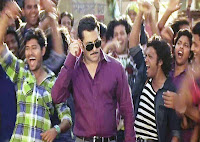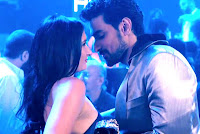Talaash ("Search") is a detective story that ultimately seems more interested in human drama than in whatever solution there is to the film's central mystery. While there are some thrills in this thriller, it's the hard-luck subplots that give it staying power--and although many of these stories get more "closure" than a strict adherence to realism would allow, that, too, can be satisfying for those willing to suspend disbelief.
Director Reema Kagti, who co-wrote story and screenplay with Zoya Akhtar, is careful to cast light on the people toiling in the shadows of the starstruck city of Mumbai even as she follows a high-profile police investigation. The chorus of the jazzy song playing under the opening credits says that "the smile is a lie" as it shows prostitutes climbing into cars and addicts drinking clouds of smoke. This beginning has a whiff of the stunningly fine opening credit sequence of Zoya Akhtar's own Luck by Chance, which also featured unsung, unglamorous people who don't often appear in glossy Bollywood films (and which remains one of my all-time favorite scenes), but Zoya's images of studio-set laborers show real people doing real jobs; in contrast, the hookers and junkies in Talaash look more like junior artistes wearing prop-room rags and glitter. Still, the cynical lyrics (by legendary film writer Javed Akhtar, who also happens to be Zoya's father) and moody look create an effective setup for the first scene.
The switch from languid addicts to action is sudden: on a deserted stretch of Seaface Road, a speeding luxury car makes a sudden right turn and plunges over the embankment into the water below. The car's driver turns out to have been fictional Bollywood hero Armaan Kapoor, and his high-profile death spurs a police investigation headed by detective Suri Shekhawat (Aamir Khan, in a dramatic moustache). Suri talks smoothly to the rich and connected, but he is just as sincere with the terrified peons--the star's driver and spotboy, inexplicably asked by the hero not to accompany him in the car that night--who have the worn-down look of people accustomed to serving the powerful.
We get repeated reminders that the story's interest is held less by the flashy crash and more by the human-scaled tragedies that happen all around it. One subplot concerns the unraveling marriage of Suri and his wife (Rani Mukherji), who are grieving the recent drowning death of their young son. She's seeing a therapist, but he's the one who can't sleep, dozing off only to enter repeated dream-world replays of the minutes just before the boy's death, and to see himself preventing the tragic outcome. Then he wakes up.
In another subplot, in a part of Mumbai that might as well be on
another planet far, far away from middle-class sorrow, lame Tehmur (Nawazuddin Siddiqui), the errand-boy of an abusive pimp, overhears things he's not supposed to know. Tehmur develops a brazen plan for working the angles and earning himself a chance for a happy-ever-after with the oldest of the prostitutes (Sheeba Chadha, also from Luck by Chance). Nawazuddin, who's been earning justified accolades in an amazing range of parts, plays the role as partly heroic and partly despicable, a character whose empathy for other miserable wretches goes only so far.
Connecting these miles-apart stories is the beautiful streetwalker Rosie (Kareena Kapoor), who spots the cop on his sleepless, aimless nightly rounds. She seems to be eyeing him as a potential customer, and for him she is, at first, merely a source of information about his case. But there's an underlying connection that isn't the one I expected. Rosie sees Suri as more kindred spirit and confidante than potential lover--and this is not the only parallel between their characters and Sahib Bibi aur Ghulam's Chhoti Bahu and Bhoothnath.*
When I watched Talaash a second time knowing the all the secrets that the film reveals as it unfolds, I did start to notice a few ragged edges. The characterizations rely more on star-power than on careful writing; Kareena Kapoor is a bit too upmarket to disappear into the role of streetwalker Rosie, Aamir Khan's character is more interesting as a bereaved dad than as a rather movie-typical upright cop, and Rani Mukerji's wise, suffering woman might be generic in other hands. But star-power can put audiences in a mood to forgive a lot of sketchiness, and it's so megawatt here that it's often enough.
The music (by Ram Sampath, who did such great work on Delhi Belly) didn't wow me, but a creepy repeated three-note motif--I swear it's the creaky-swing music from the scene in Sholay when the thakur returns home to find his family murdered--got under my skin like a fragment of a dream.
And I also couldn't shake a couple of small, telling moments from Talaash's matter-of-fact depictions of life among the sex workers and pimps. In one scene, we get a casual glimpse of a group of prostitutes asking Tehmur the servant for a drink of water--and in response, he passes the water bottle to them through the bars of the jail-like cell inside which they are imprisoned. Later a young woman whose boyfriend has been killed is dragged, wailing and protesting, back to work for the madam the boyfriend had paid for her freedom. Such moments aren't belabored, but they still manage to reveal something about what the bottom rung looks like and why it's so hard to imagine a way out.
Talaash has grim moments, but it isn't a grim movie. It's exciting and twisty and mysterious and really quite entertaining. But even if a few of the characters end up with something that looks suspiciously like a happy ending, there's no denying that this thriller has a sad, sad core. The star presence and some only-in-the-movies plot devices reassure us: relax, it's only a story! But I'm guessing that the most depressing parts are probably true.
*No, I can't tell you any more than this.
Director Reema Kagti, who co-wrote story and screenplay with Zoya Akhtar, is careful to cast light on the people toiling in the shadows of the starstruck city of Mumbai even as she follows a high-profile police investigation. The chorus of the jazzy song playing under the opening credits says that "the smile is a lie" as it shows prostitutes climbing into cars and addicts drinking clouds of smoke. This beginning has a whiff of the stunningly fine opening credit sequence of Zoya Akhtar's own Luck by Chance, which also featured unsung, unglamorous people who don't often appear in glossy Bollywood films (and which remains one of my all-time favorite scenes), but Zoya's images of studio-set laborers show real people doing real jobs; in contrast, the hookers and junkies in Talaash look more like junior artistes wearing prop-room rags and glitter. Still, the cynical lyrics (by legendary film writer Javed Akhtar, who also happens to be Zoya's father) and moody look create an effective setup for the first scene.
 |
| Studio construction workers in Zoya Akhtar's Luck by Chance |
 |
| Rani and Aamir falling apart |
In another subplot, in a part of Mumbai that might as well be on
 |
| Nawazuddin plotting a way out |
Connecting these miles-apart stories is the beautiful streetwalker Rosie (Kareena Kapoor), who spots the cop on his sleepless, aimless nightly rounds. She seems to be eyeing him as a potential customer, and for him she is, at first, merely a source of information about his case. But there's an underlying connection that isn't the one I expected. Rosie sees Suri as more kindred spirit and confidante than potential lover--and this is not the only parallel between their characters and Sahib Bibi aur Ghulam's Chhoti Bahu and Bhoothnath.*
 |
| Eena Meena Kareena |
The music (by Ram Sampath, who did such great work on Delhi Belly) didn't wow me, but a creepy repeated three-note motif--I swear it's the creaky-swing music from the scene in Sholay when the thakur returns home to find his family murdered--got under my skin like a fragment of a dream.
And I also couldn't shake a couple of small, telling moments from Talaash's matter-of-fact depictions of life among the sex workers and pimps. In one scene, we get a casual glimpse of a group of prostitutes asking Tehmur the servant for a drink of water--and in response, he passes the water bottle to them through the bars of the jail-like cell inside which they are imprisoned. Later a young woman whose boyfriend has been killed is dragged, wailing and protesting, back to work for the madam the boyfriend had paid for her freedom. Such moments aren't belabored, but they still manage to reveal something about what the bottom rung looks like and why it's so hard to imagine a way out.
Talaash has grim moments, but it isn't a grim movie. It's exciting and twisty and mysterious and really quite entertaining. But even if a few of the characters end up with something that looks suspiciously like a happy ending, there's no denying that this thriller has a sad, sad core. The star presence and some only-in-the-movies plot devices reassure us: relax, it's only a story! But I'm guessing that the most depressing parts are probably true.
*No, I can't tell you any more than this.










.jpg)














+Hindi.jpg)





